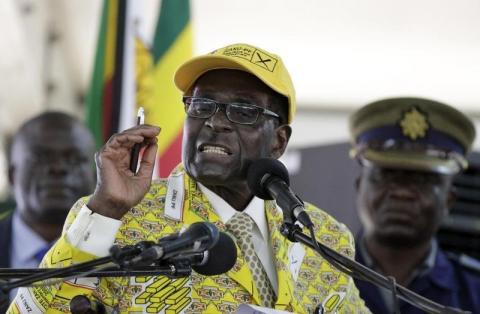Advertisement
Zimbabwe's Mugabe, 90, becomes African Union chairman
ADDIS ABABA (Reuters) - Ninety-year-old Zimbabwe President Robert Mugabe, one of Africa's most divisive figures, ascended to the rotating chairmanship of the African Union (AU) on Friday, casting a shadow over the continental body's relations with the West.
The only leader Zimbabwe has known since independence from Britain in 1980 assumed the largely ceremonial role when he was handed the AU flag and gavel at a summit in the Ethiopian capital, Addis Ababa.
In his acceptance speech, Africa's oldest head of state spoke of the need to guard against foreigners exploiting the continent's mineral wealth and called for more assistance for African farmers.
"African resources should belong to Africa and to no one else, except to those we invite as friends. Friends we shall have, yes, but imperialists and colonialists no more,” he said, to applause from his peers.
In some corners, Mugabe is feted as a nationalist hero who triumphed over colonial power Britain on the battlefield and at the ballot box, and who remained steadfast in his commitment to the promotion of black African power in the 34 years since.
"Zimbabwe is an important member state, a very committed country," Algerian Foreign Minister Ramtane Lamamra told Reuters on the sidelines of the summit.
In other corners, however, he is seen as a despotic pariah responsible for human rights abuses, rigged elections and turning one of Africa's most promising nations into a basket case.
"Mugabe has trashed democracy in Zimbabwe and he and his party have ruined the economy," said Obert Gutu, a spokesman for the opposition Movement for Democratic Change (MDC) in the Zimbabwean capital Harare.
"He lacks the political legitimacy to lead an Africa that should be looking to consolidate democracy and good governance."
It is a view shared in the European Union and United States, which imposed travel and financial sanctions on Mugabe and his acolytes after election victories over the MDC in 2002 and 2008 marred by violence and charges of vote-rigging and intimidation.
Mugabe denies any wrongdoing.
Some Western nations were "not thrilled" about Mugabe's appointment, a Western diplomat who follows African affairs said, though adding that it would not disrupt relations with the AU. "We are working with the African Union regardless of the president," the diplomat added.
As AU chairman, Mugabe can influence topics for debate although other leaders and commissions also frame discussions.
Piers Pigou, southern Africa director for the International Crisis Group think tank, said the continent needed to show it was improving the quality of its democracies, but that it was not only Mugabe who was likely to dodge such questions.
"Which African leader, if they were made chairperson of the AU, would stick their neck out and push such an agenda?”



















Add new comment